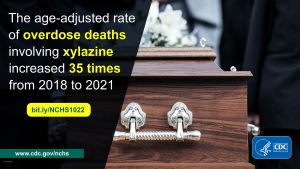New Analysis Looks at Drug Overdose Deaths Involving Xylazine
Posted on by NCHS released a new report, “Drug Overdose Deaths Involving Xylazine, 2018‒2021,” that presents trends in drug overdose death rates involving xylazine from 2018 through 2021 in the United States. The report uses an established methodology for examining death certificate literal text to identify drug overdose deaths involving xylazine that occurred in the United States among U.S. residents.
NCHS released a new report, “Drug Overdose Deaths Involving Xylazine, 2018‒2021,” that presents trends in drug overdose death rates involving xylazine from 2018 through 2021 in the United States. The report uses an established methodology for examining death certificate literal text to identify drug overdose deaths involving xylazine that occurred in the United States among U.S. residents.
Rates of drug overdose deaths involving xylazine also are presented by age group and race and Hispanic origin for 2020 and 2021, and by HHS public health region for 2021. Data about the drugs most frequently co-involved in these overdose deaths are also reported for all study years.
Key Findings:
- The rate of drug overdose deaths involving xylazine in 2021 was 35 times higher than the rate in 2018 from 0.03 (per 100,000) in 2018 to 1.06 in 2021.
- Death certificates show that drug overdose deaths involving xylazine increased from 102 in 2018 to 3,468 in 2021.
- Males were at least twice as likely as females to die from drug overdoses involving xylazine each year from 2018 to 2021.
- In 2021, the rate of drug overdose deaths involving xylazine was highest among those aged 35‒44 (2.24) and lowest among those aged 0‒24 (0.16).
- From 2020 to 2021, drug overdose deaths rates involving xylazine increased from
- 68 in 2020 to 1.82 in 2021 for Black people.
- 58 in 2020 to 1.21 in 2021 for White people.
- 21 in 2020 to 0.64 in 2021 for Hispanic people.
- For non-Hispanic people of more than one race, the rate was not reportable in 2020 but was 0.35 in 2021.
- In 2021, the rate of drug overdose deaths involving xylazine was highest in HHS Public Health Region 3 (Delaware, District of Columbia, Maryland, Pennsylvania, Virginia, West Virginia) at 4.05 per 100,000.
- The percentage of death certificates for drug overdose deaths involving xylazine that mentioned fentanyl ranged from 97.1% to 99.4% between 2018 and 2021.
Posted on by
Page last reviewed: June 30, 2023
Page last updated: June 30, 2023
Content source:
CDC, National Center for Health Statistics

